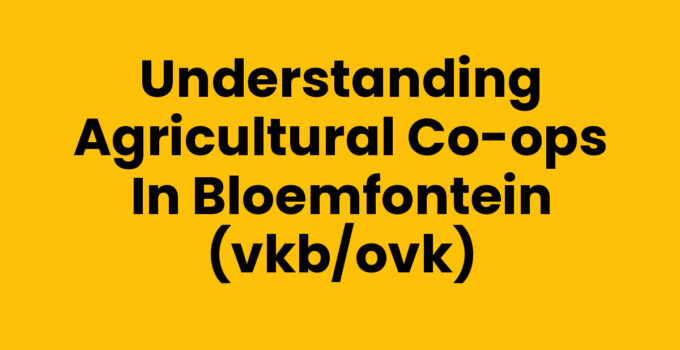Agricultural cooperatives, particularly VKB and OVK in Bloemfontein, play a pivotal role in the region’s agricultural landscape. They provide essential services to farmers, including marketing, input supply, and access to technology. In this blog post, we will delve into the operations of these co-ops, their significance in supporting local agriculture, and the considerable advantages they offer to farmers.
Agricultural Co-ops in Bloemfontein (VKB/OVK): Overview and Benefits
Agricultural cooperatives, such as VKB and OVK, are organizations owned and operated by farmers to serve their mutual interests. In Bloemfontein, these co-ops are crucial in enhancing productivity and improving farmers’ livelihoods. Here’s a step-by-step guide to understanding the benefits and operations of these cooperatives.
1. What are Agricultural Co-ops?
Agricultural cooperatives are formed when farmers come together to achieve common goals. They collectively manage resources, reducing costs, and are often able to harness collective bargaining power. VKB and OVK are excellent examples of this model in action, serving various agricultural sectors.
2. Key Functions of VKB and OVK
The VKB and OVK cooperatives provide numerous services to their members, including:
- Input Supply: Farmers can obtain quality seeds, fertilizers, and pesticides at competitive prices.
- Marketing and Sales: Co-ops help members market their produce more effectively, ensuring better prices.
- Access to Technology: Members can benefit from modern farming techniques and technologies offered through these organizations.
3. How to Join VKB or OVK
If you are a farmer in Bloemfontein considering membership in VKB or OVK, follow these steps:
- Research: Gather information about both cooperatives to decide which one aligns better with your farming needs.
- Application: Submit an application through their respective websites or local branches.
- Attend Orientation: New members typically go through an orientation to understand the cooperative’s operations and benefits.
- Engage with Other Members: Network with other farmers within the cooperative to share knowledge and resources.
The Advantages of Joining Agricultural Co-ops
Joining VKB or OVK comes with several advantages:
- Reduced Costs: By pooling resources, co-op members often achieve lower prices on inputs and services.
- Market Access: Co-ops have better connections for selling produce, often resulting in higher profit margins for members.
- Shared Knowledge: Membership opens up opportunities for learning from experienced farmers and accessing workshops and training programs.
Challenges Faced by Agricultural Co-ops
While there are many benefits, agricultural cooperatives can also face challenges:
- Conflicts Among Members: Diverse interests can lead to disagreements on the direction of the co-op.
- Management Issues: Inefficient management can hinder cooperative operations and member satisfaction.
- Adaptation to Market Changes: As markets evolve, co-ops must adapt quickly to stay relevant and effective.
Overall, while challenges exist, the benefits of joining VKB or OVK far outweigh the disadvantages for most farmers in Bloemfontein.
Conclusion
Agricultural co-ops like VKB and OVK are integral to the agricultural framework in Bloemfontein, facilitating a support system that empowers farmers. By pooling resources, sharing knowledge, and improving market access, they enhance productivity and sustainability within the farming community. For any farmer looking to improve their operation, joining such a cooperative could be a transformational step.
Frequently Asked Questions
What is the role of VKB and OVK in Bloemfontein?
VKB and OVK provide essential services like input supply, marketing, and access to technology for local farmers.
How can I join an agricultural co-op like VKB?
To join VKB, research their services, submit an application, and participate in an orientation to understand member benefits.
What are the benefits of agricultural cooperatives?
Co-operatives offer reduced costs, better market access, and shared knowledge through networking among farmers.



